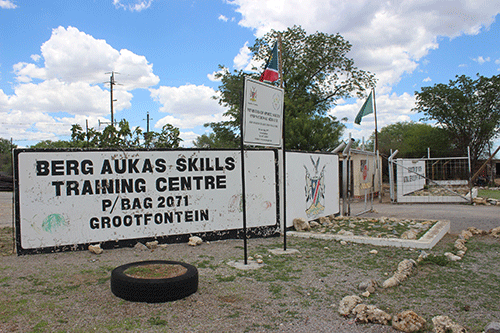Auditor general Junias Kandjeke found most youth centres across the country in a dilapidated state mainly due to lack of funds, a situation that poses serious health and safety risks for students.
Kandjeke’s findings are contained in an audit report, focusing on youth unemployment in the country, which was recently submitted to the National Assembly for scrutiny.
The report covers the 2018/2019, 2019/2020 and 2020/2021 financial years.
For the current financial year, the sport, youth and national service ministry received a budgetary allocation of N$473.2 million.
The audit focused on training programmes offered at the youth centres, training policy for instructors and youth officers, the supply of study materials equipment and repair thereof, funds collected by youth centres from registration of programmes
and selling of the end products made during training and the settlement of youth centres service accounts by the ministry.
The last time the AG’s office conducted a similar performance audit was in 2009.
According to a report by Konrad Adenauer Stiftung, Namibia’s unemployment rate stood at 33.6% in 2021, while the younger in the age group 20-24 made up 57.0%.
“This indicates that unemployment is still a persistent challenge amongst the Namibian youth,” Kandjeke said.
The audit found that during the period under review, there was no upgrading of the facilities in all the regions visited due to budgetary constraints, with the exception of the Opuwo youth centre in Kunene.
MPYRC in Kunene and the Berg Aukas Skills Training Centre in Otjozondjupa.
“The audit concludes that all of the centres are in need of renovations because they pose a significant safety and health risk. This is due to a lack of finances and unavailability of materials to carry out facilities’ maintenance and upgrades. Thus, the facilities degrade over time, as problems accumulate, which leads to the facilities becoming unappealing to the target group,” Kandjeke states in the report.
Kandjeke further said: “It was further revealed through physical observations conducted that the centres needed general wear and tear repairs of facilities. Physical observations conducted at the Windhoek Multi-Purpose Youth Resource Centre revealed that the centre is in need of maintenance, as the facility is in a dilapidated state, with some sections posing a serious safety and health hazard”.
Another major finding was that there were no standard curricula or manuals for all trades offered at the multipurpose youth resource centre and skills training centre countrywide.
Instead, instructors created their teaching content for the programmes offered at their particular centre, based on what is prevalent in their trade and market.
“However, the ministry has disseminated the unit standards from the Namibia Training Authority (NTA) for all trades to all training centres countrywide.
“These unit standards were not applied at the time of the audit due to budgetary constraints, lack of qualified instructors who are not evenly distributed across the centres and the target group for the programme is heterogeneous,” he added.
What is more, the auditors concluded there are no controls in place to ensure late supplies of study materials or equipment and repair of broken equipment are minimised to avoid any delays in the training process.
“The audit recommends that the Ministry of Sports, Youth and National Service works with relevant stakeholders to improve how the NTA requirements can be implemented, so that trained youth in different parts of the country are at the same level.
“The ministry should introduce standard curricula or manuals for all programmes offered at the youth training centres to ensure the quality, recognition of qualifications obtained and to enable trained youth to be on the same level all over the country.” Kandjeke recommended.
Consequently, delays in getting training materials and equipment have a severe impact on the programmes, as instructors are forced to stop teaching due to the unavailability of essential equipment.
“The ministry should establish an internal user-friendly procedure for requesting study materials or equipment, and for repairing broken equipment to guarantee that instructors have all the necessary equipment before training commences and to prevent disrupting the training process,” he added.
The information for the follow-up audit was collected from five regions, namely Khomas [Windhoek Multi-Purpose Youth Centre (MPYRC)]; Kunene (Opuwo MPYRC); Omusati (Okahao Skills Training Centre and the MPYRC in Outapi); Oshana (Oshakati MPYRC), and Otjozondjupa (Berg Aukas Skills Training Centre).
The regions were selected because they formed part of the main audit in 2009 to determine whether the recommendations were implemented appropriately.
“The audit experienced limitations in the availability of documents, especially with regards to service account invoices and documentary proof on completion of job attachments by students.
“This hampered the auditors’ ability to thoroughly analyse and conclude the extent to which delays the in settling of invoices had occurred and to what extent job attachment was being carried out,” the auditor lamented.
- emumbuu@nepc.com.na
Caption:


